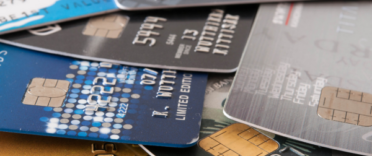 All credit card applicants must undergo a full credit check for two main reasons. The first is that running a credit check gives the credit card provider greater confidence that you can be relied upon to make the required monthly repayments to pay back your debt. The second is that a credit check assesses whether or not you can afford to take on the debt. This should deter irresponsible lending and stop a borrower taking on unmanageable levels of debt. In this article we explain why a credit check is an essential part of getting a credit card, how you can borrow with a low credit score and what credit card alternatives are out there.
All credit card applicants must undergo a full credit check for two main reasons. The first is that running a credit check gives the credit card provider greater confidence that you can be relied upon to make the required monthly repayments to pay back your debt. The second is that a credit check assesses whether or not you can afford to take on the debt. This should deter irresponsible lending and stop a borrower taking on unmanageable levels of debt. In this article we explain why a credit check is an essential part of getting a credit card, how you can borrow with a low credit score and what credit card alternatives are out there.
Can I get a credit card with no credit check?
In the UK it is not possible to get a credit card without a credit check. However, a credit check will not necessarily prevent you from getting a credit card, even if you have a bad credit history. Many providers offer cards for applicants with bad credit, so you may still be able to find a credit card with a poor financial history or low credit score.
Some of these cards may also be able to help you rebuild your credit record and boost your credit score. Read our article 'How to build your credit score with a credit card' to learn more. We also have the best credit-builder card deals on our 'Credit-builder cards – which is the best credit card if I have poor credit?' page.
You can see how likely you are to be accepted for a specific credit card before you apply by using an online eligibility checker.
What is a credit check?
A credit check – also known as a credit search – is the process of a company looking at information about your financial history and current financial position. This information is used to help determine whether you should be accepted for a financial product, such as a credit card or loan. The provider will want to be confident that you can be relied upon to make at least the minimum payment on time. If you have a history of missing payments or going beyond your credit limit, you may be turned down for some products. Similarly, if you have a limited credit history because you haven't previously borrowed money, you may also not be considered a good person to lend to.
There are three main credit reference agencies in the UK: Experian, Equifax and TransUnion. Each organisation collates the information on your past and present financial behaviour and comes up with an overall credit score. All three credit reference agencies work slightly differently and come up with a score based on different scales, so your credit score or rating isn't universal. Moreover, not every financial company will provide information to each credit agency and lenders may only use the services of one or two when running their own checks.
This all means that it is important to keep on top of what is included in each of your credit reports, particularly if you suspect there may be issues that could stop you from being accepted for the financial products you want to apply for. Read our article 'The best way to check your credit score for free' to learn more about keeping track of your credit score.
What are 'hard' and 'soft' credit checks?
It is important to distinguish between a hard and soft credit check. A full credit card application will always involve a 'hard' credit check. This will leave a mark on your credit record and future prospective lenders will be able to see that you have previously applied for credit. This means that too many applications in too short a period of time can suggest to lenders that you are desperate for credit and struggling to manage your finances. If you have just been turned down for a credit card, don't rush into applying for another one. We have more information in our article '5 things to do if you're turned down for a credit card'.
A 'soft' credit check is very different because it does not leave a mark on your credit file. You are usually subject to a soft check if you use an online eligibility checker. This could be on a provider's website or on a comparison site.
Using an eligibility checker
While it is a requirement for all credit card providers to run a 'hard' search on your credit file – a thorough search that is then also included in your credit history – there is also the option with most companies to run a 'soft' search first. This is a search that is not visible to other companies or lenders. If you are nervous about having to undertake a hard credit check when applying for a credit card because you think you won't be accepted, using an eligibility checker is a good way of seeing in advance how likely you are to be given the green light.
Eligibility checkers perform a soft search that won't have a negative impact on any credit scoring if you're rejected for a product, which is what would happen with a hard search. The majority of credit cards will have an eligibility checker on their website as a first step in the application process, alongside information on their standard eligibility requirements. There is information on the main types of credit cards and links to their eligibility checkers in our article 'How to choose the best credit card for your needs'.
We have teamed up with Creditec* to help you compare credit card deals and check your eligibility in minutes. You will be able to find out which credit cards you are most likely to be accepted for through a soft credit check, which will not affect your credit score. You can then tailor your personalised list to sort cards by the features that matter most to you. This could mean filtering for the type of credit card you want, sorting the list by the rate of interest or highlighting the cards you are most likely to be successful in applying for. You can click here to compare deals*.
Credit cards for people with bad credit
A key reason for many people not wanting to be credit checked is because they think certain past events on their file could negatively impact their chances of getting a credit card. This could be a minor issue, such as a one-off late payment, through to things like County Court Judgements (CCJs), individual voluntary arrangements (IVAs) and bankruptcy. However, there are now a wide-range of cards specifically targeted at those with a less-than-perfect credit history.
So-called 'bad credit' credit cards generally have higher APRs to balance out the extra risk the card provider is taking on by extending credit to someone with a poor credit history. They also offer the opportunity for customers to improve their future creditworthiness by demonstrating they can use the card responsibly, by making payments on time and not exceeding the agreed credit limit. However, it is worth noting that there are other ways to improve your credit score without taking out one of these – potentially expensive – cards. For suggestions, read our article 'How to improve your credit score quickly'.
The eligibility criteria for credit-builder cards can vary greatly, with some only accepting those with minor past financial issues, while others are open to people with more severely impaired credit histories. To avoid being turned down for a card, which will have a further negative impact on your credit score, it is important to have a clear idea of the eligibility criteria for the card you wish to apply for. Ideally, you should also use an eligibility checker before completing the full application.
For more information on cards you may be accepted for if you have poor credit, read our article 'Compare the best credit cards if you have bad credit'.
If a link has an * beside it this means that it is an affiliated link. If you go via the link Money to the Masses may receive a small fee which helps keep Money to the Masses free to use. But as you can clearly see this has in no way influenced this independent and balanced review of the product.






